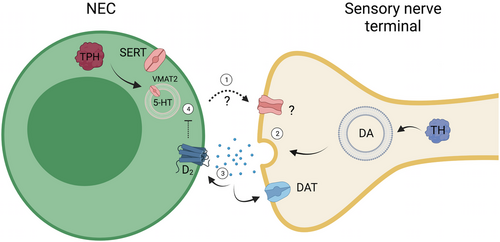Fig. 10 Model of the proposed role for dopamine in modulating the hypoxic response in gill neuroepithelial cells (NECs) of the efferent epithelium. As shown in the present study, postsynaptic nerve terminals in the gill filaments express tyrosine hydroxylase (TH) and the dopamine active transporter (DAT), involved in synthesis and uptake of dopamine (DA), respectively. When the NEC is stimulated during hypoxia: (1) Release of an unknown neurotransmitter from the NEC activates a postsynaptic receptor on the sensory nerve terminal. (2) Dopamine is then released from the nerve terminal and (3) activates presynaptic D2 receptors of the NEC, or is taken up postsynaptically by DAT. (4) The former leads to inhibition of the NEC response to hypoxia. The excitatory neurotransmitter released by NECs has not been confirmed but may be serotonin (5-HT). As illustrated, zebrafish NECs contain 5-HT, synaptic vesicles, and the vesicular monoamine transporter, VMAT2 (Jonz & Nurse, 2003; Pan et al., 2021). NECs also express genes encoding tryptophan hydroxylase and the serotonin transporter (SERT) for possible 5-HT synthesis and uptake (Pan et al., 2022). Created with BioRender.com.
Image
Figure Caption
Acknowledgments
This image is the copyrighted work of the attributed author or publisher, and
ZFIN has permission only to display this image to its users.
Additional permissions should be obtained from the applicable author or publisher of the image.
Full text @ J. Comp. Neurol.

